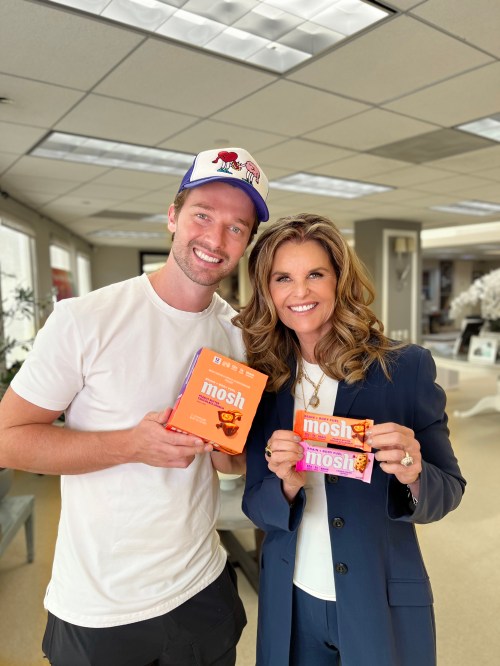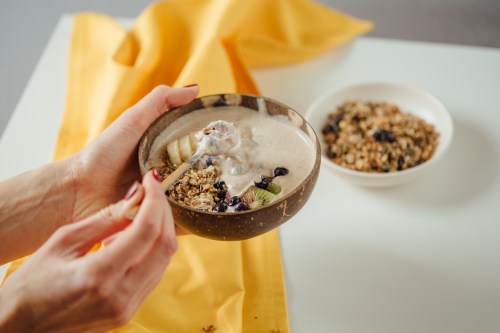Patrick Schwarzenegger Does These 4 Things Every Day to Keep His Brain Sharp—and You Need to Do Them, Too
Plus, why brain health is so near and dear to his heart.

For Patrick Schwarzenegger, taking care of his brain isn't just a critical part of his well-being; it's personal. The White Lotus star shares that nurturing his brain health—and advocating others to do the same—stemmed from witnessing a family member live with Alzheimer's disease.
In the early 2000s, Schwarzenegger's maternal grandfather was diagnosed with the progressive brain disorder, which is known for causing symptoms such as memory loss, personality and mood changes, and difficulty completing familiar tasks. Deeply moved by her father's diagnosis, Schwarzenegger's mother, journalist Maria Shriver, noticed the lack of research and funding towards Alzheimer's and dementia care—particularly in women, who make up nearly two-thirds of all Alzheimer's cases.
"There was a disproportionate amount of funding for women's Alzheimer's research, and all of the brain-related studies were being done on men," Schwarzenegger tells Well+Good. And he's right. The 2021 Women's Health Access Matters (WHAM) report found that despite women making up the majority of Alzheimer's disease cases, only 12 percent of funding is allocated to studies that specifically focus on women.
These disparities were even larger at the time of Schwarzenegger's grandfather's diagnosis, which is what eventually led Shriver to found the Women's Alzheimer's Movement (WAM) in 2010. This movement became the world's first organization that was exclusively dedicated to research and advocacy for women with Alzheimer's disease, and remains committed to providing education and resources to women and their families about Alzheimer's disease prevention. A decade later, WAM partnered with the Cleveland Clinic to open up the Women’s Alzheimer’s Movement Prevention and Research Center to promote women's brain health.
But Shriver's dedication to Alzheimer's advocacy didn't stop there. "When I moved back home with her during COVID, she had this idea to build a food company that was mission-driven, raised money for Alzheimer's, and educated consumers about how what they ate impacted their brain," Schwarzenegger explains. Enter: MOSH, the mother-son duo's protein bar brand, which donates a portion of its proceeds from food sales to fund Alzheimer's research. In just a few years, MOSH has raised over $200,000 to fund dementia-related studies, and continues to educate the community about brain health with in-person events in Los Angeles. (FYI, you can get the deets for all these events by signing up for their newsletter at moshlife.com or following them on Instagram.)

Today, Schwarzenegger remains determined to share the importance of brain care with his community, especially young people who may not realize that Alzheimer's prevention needs to start early. "There are things you can do today that can help your brain health tomorrow or next year or in a decade from now," Schwarzenegger says. "We don't know necessarily if they can stop Alzheimer's from developing, but we know that it could prolong our life without it."
He sat down with us to discuss what he does in his personal life to nurture his mind and keep his brain sharp—and trust us, you'll want to listen to and follow his advice.
Walks 10,000 steps a day
A longitudinal (read: long-term) cohort study published in JAMA Neurology in 2022 followed 78,000 people between the ages of 40 and 79 who wore fitness trackers three days a week for seven years. Researchers found that those who walked at least 9,800 steps per day were 51 percent less likely to develop dementia, compared to people who were inactive.1
"After I read that study, I made it a goal to try and get 10,000 steps every single day," Schwarzenegger says. Fitness is an important part of his overall wellness routine, and he finds that walking is a good way to take care of his brain and get some fresh air, even stating that he likes to take calls on the go so he can get his work done while getting a workout in. Schwarzenegger also tells us that incorporating any form of fitness into his day is important, and he also makes time to lift weights throughout the week.
Loads up on brain-boosting foods
We know that the food we eat can affect our bodies, but nutrition also plays an important role in our cognitive functioning. That said, eating certain foods can increase your risk of developing brain disorders like dementia. According to the Fisher Center for Alzheimer's Research Foundation, eating foods that are high in sugar, saturated fats, and highly processed can raise your chances of having Alzheimer's disease.
Knowing this, Schwarzenegger has an eating plan that is high in protein and fiber and low in sugars. And research supports his decision. Experts recommend adding foods like whole grains, fruits, vegetables, legumes, and fish to your meal prep. And if these foods are new to you, you don't have to make wholesale changes all at once (unless you'd like to, of course!) Taking it slow and gradually adding brain-boosting foods to your meals is a good way to build a nutritious and delicious eating plan.
Socializes with others
Good news, extroverts: Spending time with others doesn't just make you feel good, it's also a critical way of reducing your risk of dementia. A 2025 analysis funded by the National Institute on Aging found that social isolation and loneliness can increase your susceptibility to dementia and Alzheimer's disease by 31 percent.
Schwarzenegger understands the importance of staying in touch with others and communicating with loved ones daily. It's also one of the reasons why MOSH puts on so many in-person events, like their walk clubs in Santa Monica, California. "Of course, the walk club is an effort to get people to get their steps in, but it's mostly a time for people to kind of gather and meet others, build community, and connect in a brain-healthy way," he explains.
Challenges his brain
When asked what he recommends others do to better nurture their brain health, Schwarzenegger had a very simple response. "The best way to take care of your brain is by utilizing it," he says. And Schwarzenegger has found some fun ways to keep his mind stimulated.
A big part of acting is to make sure you know all your lines. "One way I try to use my brain is by memorizing scripts for my projects," he explains. When he's not at work, he also enjoys playing the daily Wordle (I mean, who doesn't?) and board games like Rummikub, which help challenge his brain. So if you needed an excuse to host a game night, now you have a perfect reason to.
- Del Pozo Cruz, Borja et al. “Association of Daily Step Count and Intensity With Incident Dementia in 78 430 Adults Living in the UK.” JAMA neurology vol. 79,10 (2022): 1059-1063. doi:10.1001/jamaneurol.2022.2672 ↩︎










